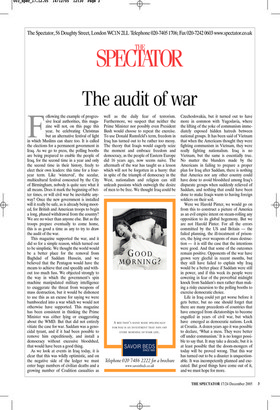The audit of war
Following the example of progressive local authorities, this magazine will not, on this page this year, be celebrating Christmas but an alternative festival of light in which Muslims can share too. It is called the elections for a permanent government in Iraq. As we go to press, the polling booths are being prepared to enable the people of Iraq, for the second time in a year and only the second time in their history, freely to elect their own leaders: this time for a fouryear term. Like ‘winterval’, the secular, multicultural festival concocted by the City of Birmingham, nobody is quite sure what it all means. Does it mark the beginning of better times, or will civil war be inevitable anyway? Once the new government is installed will it really be safe, as is already being mooted, for British and American troops to begin a long, phased withdrawal from the country? We are no wiser than anyone else. But as the troops prepare eventually to come home, this is as good a time as any to try to draw the audit of the war.
This magazine supported the war, and it did so for a simple reason, which turned out to be simplistic. We thought the world would be a better place for the removal from Baghdad of Saddam Hussein, and we believed that the Pentagon would have the means to achieve that end speedily and without too much fuss. We objected strongly to the way in which the government’s spin machine manipulated military intelligence to exaggerate the threat from weapons of mass destruction, but it would be dishonest to use this as an excuse for saying we were bamboozled into a war which we would not otherwise have supported. This magazine has been consistent in thinking the Prime Minister was either lying or exaggerating about the WMD. But that did not entirely vitiate the case for war. Saddam was a genocidal tyrant, and if it had been possible to remove him expeditiously, and install a democracy without excessive bloodshed, that would have been a good thing.
As we look at events in Iraq today, it is clear that this was wildly optimistic, and on the negative side of the ledger we must enter huge numbers of civilian deaths and a growing number of Coalition casualties as well as the daily fear of terrorism. Furthermore, we suspect that neither the Prime Minister nor possibly even President Bush would choose to repeat the exercise. To use Donald Rumsfeld’s term, freedom in Iraq has turned out to be rather too messy. The theory that Iraqis would eagerly seize the moment and embrace freedom and democracy, as the people of Eastern Europe did 16 years ago, now seems naive. The aftermath of the war has taught us a lesson which will not be forgotten in a hurry: that in spite of the triumph of democracy in the West, nationalism and religion can still unleash passions which outweigh the desire of men to be free. We thought Iraq could be Czechoslovakia, but it turned out to have more in common with Yugoslavia, where the lifting of the yoke of communism immediately exposed hidden hatreds between national groups. It has been said of Vietnam that when the Americans thought they were fighting communism in Vietnam, they were really fighting nationalism. Iraq is no Vietnam, but the same is essentially true. No matter the blunders made by the Americans in failing to prepare a proper plan for Iraq after Saddam, there is nothing that America nor any other country could have done to avoid bloodshed among Iraq’s disparate groups when suddenly relieved of Saddam, and nothing that could have been done to make Iraqis warm to having foreign soldiers on their soil.
Were we Harold Pinter, we would go on from this to construct a picture of America as an evil empire intent on steam-rolling any opposition to its global hegemony. But we are not Harold Pinter. For all the errors committed by the US and Britain — the failed planning, the ill-treatment of prisoners, the lying over weapons of mass destruction — it is still the case that the intentions were good. And that some of the outcomes remain positive. Opponents of the war have grown very gleeful in recent months, but they still have failed to explain why Iraq would be a better place if Saddam were still in power, and if this week its people were cowering in fear of the proverbial midnight knock from Saddam’s men rather than making a risky excursion to the polling booths to exercise democratic choice.
Life in Iraq could yet get worse before it gets better, but no one should forget that there are many precedents of countries that have emerged from dictatorships to become engulfed in years of civil war, but which have emerged as democratic nations. Look at Croatia. A dozen years ago it was possible to declare, ‘What a mess. They were better off under communism.’ It is no longer possible to say that. It may take a decade, but it is at least possible that the doom-mongers of today will be proved wrong. That this war has turned out to be a disaster is unquestionable. It was incompetently planned and executed. But good things have come out of it, and we must hope for more.


















































































 Previous page
Previous page